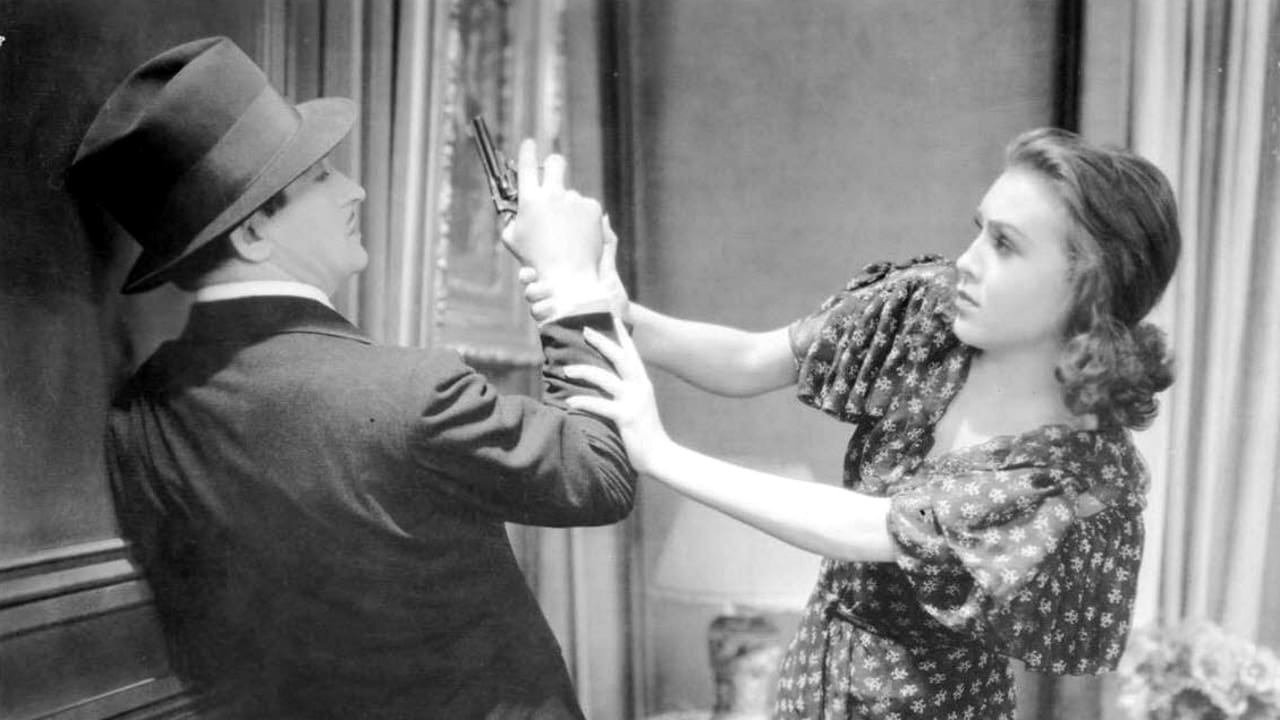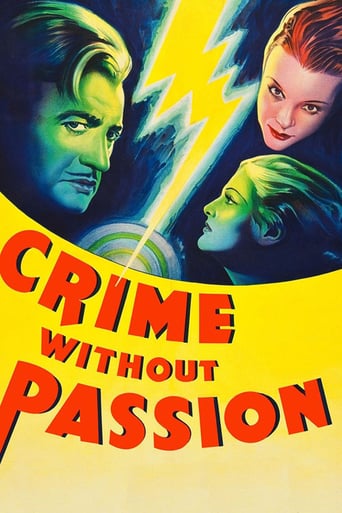Exoticalot
People are voting emotionally.
Neive Bellamy
Excellent and certainly provocative... If nothing else, the film is a real conversation starter.
Leoni Haney
Yes, absolutely, there is fun to be had, as well as many, many things to go boom, all amid an atmospheric urban jungle.
Stephanie
There is, somehow, an interesting story here, as well as some good acting. There are also some good scenes
kevin olzak
1934's "Crime Without Passion" is a rarely seen independent written, produced, and directed by regular writing team Ben Hecht and Charles MacArthur ("The Front Page"), which was followed by three more in a span of two years- "The Scoundrel," "Once in a Blue Moon," and "Soak the Rich" (Hecht directed three more without MacArthur, who never directed again). Shot on Long Island in May-June 1934, this was Claude Rains' first feature since the phenomenal success of his Hollywood debut "The Invisible Man," and the actual film debut of actress/dancer Margo, niece of Xavier Cugat, remembered as the wife of GREEN ACRES' Eddie Albert, and mother of Edward Lawrence Albert (who looked just like his beautiful mother). Top billed Rains excels as Lee Gentry, smug, self-satisfied defense attorney, cool under fire in the courtroom, dismissing his guilty clients as little more than insects, using women much the same way. On one hand is long suffering lover Carmen Brown (Margo), who simply cannot let go, while he has since fallen for Katy Costello, who would rather they part as friends (played by Whitney Bourne, also making her film debut, finishing with less than a dozen credits). The lustful Gentry schemes to rid himself of Carmen, first falsely accusing her of seeing an old flame (Stanley Ridges), then confronting her in her apartment (with a loaded gun). Things go badly as he unintentionally shoots her, then must build an alibi for himself, desperately trying to maintain his composure with his own neck in the hangman's noose. A welcome last gasp of pre-code paranoia, a fascinating study of a most unlikable lead character; Claude Rains continued his newfound stardom in "The Man Who Reclaimed His Head," "Mystery of Edwin Drood," and "The Clairvoyant." Surprise cameos from Ben Hecht and Charles MacArthur as reporters interviewing Gentry 10 minutes in, even more surprising cameos from their respective wives 48 minutes in, Fanny Brice and Helen Hayes, seen by the camera panning through a hotel lobby. Another feature debut is that of Paula Trueman, a ubiquitous presence playing elderly eccentrics in the 70s and 80s, looking very much like Fanny Brice's 'Baby Snooks' in her scene stealing role as Buster Malloy, Carmen's stage partner, who inadvertently aids the despised Gentry with his meticulously plotted alibi.
chaos-rampant
This is simply directed by a duo of writers who financed themselves. Hecht was a new introduction for me but looking through his resume I realize I've seen several of his work (who hasn't?). He could really write, and this beats any of Hitchcock's stuff until Notorious which they wrote together. This is a small film but wickedly clever, all about illusion and ego; indeed if you decide to track it down it must be for the weaving of these two notions.We have a snooty intellectual, a lawyer, who looks down from his window on the dumb riffraff on the street that he now and then defends in court for amusement, for merely the intellectual challenge of outwitting the law. Justice doesn't play a part. It's all a big show; we see him early in court marvelously perform in front of a grand jury, acquitting a killer.The film essentially begins when he accidentally kills a scorned girlfriend, setting off the divine farce where he will have to face a higher law. Anticipating the case, our fool walks around setting alibis, doctoring clues, constructing the story he will present to an audience. Leaving her building, he feels that he may be watched from every window. Paranoia creeps in. We watch all this unfold in real time.This isn't some abstract notion at play, and what separates the truly great films is that they can take it up in its full significance. Namely, that we all carry this intellectual mind constantly trying to plan stories ahead of us, master the narrative. That most of the time we put it to destructive use and only obscure the true world where those things are one.You'll notice in the film that for all its mechanical cleverness his constructed story is ultimately proved false; the world itself outwits him. That it creates for him so much useless drama and anxiety out of nothing. And that had he been simply honest, to himself first, he would have been with the woman he loves.Of course it all happens so this intellectual who thinks himself better, above others and law, will find himself down here in the world of human passions, punished by the gods of noir.What struck me the most however was the following bit. As he begins to plot his escape story, a hovering ghost self (his 'legal mind') appears next to him, dictating the story. It isn't cinematic to see because it creates an easy duality: real and not real, madness and sanity on clean sides.. But it is that illusory self separated from the world, and in the separation it plainly shows the human left behind, lapsing into hallucination.Cornerstones of noir, and we have them here so clearly: hovering mind, fates and hallucination.When noir proper would roll around this hovering mind attempting manipulation becomes the elusive fabric of noir world, leaving behind the schmuck to lapse into hallucination. The scene near the end here where the girlfriend appears to him may as well be hallucinated. Noir Meter: 3/4
kidboots
Critics and public alike were dazzled by "Crime Without Passion" written, produced and directed by Ben Hecht and Charles MacArthur, who had collaborated on many plays over the years. Having the Paramount Astoria, New York studio almost to themselves, photographer Lee Garmes and special effects director Slavko Vorkapich created many striking technical innovations often copied over the years.For the small percentage of the public who happened to see this independently made film - the astonishing first few moments would have shocked them out of their seats. Near naked furies rise from a murdered woman's blood and with breaking glass and maniacal laughter show the sordidness of tawdry affairs. Lee Gentry (Claude Rains) is a brilliant but cynical attorney who claims there would be no-one in prison if there were more attorneys like him to defend them. In his private life he is not so brilliant as he is completely besotted with icy but socially prominent Katie (Whitney Bourne) and far above (in his opinion) Carmen Brown (Margo), his current inamorata, who is clingy but passionate and loving.Lee thinks he knows all the angles involving criminal law which comes in handy when he accidentally kills Carmen - or does he??? Goaded on by his alter ego the all too human Lee, while setting up a certain Mr. White (Stanley Ridges, who was also excellent in "Black Friday" (1940)) to take a fall, accidentally drops a telegram on his way to Carmen's apartment, then bumps into a woman he wishes to avoid in the middle of setting up his alibi.All too soon it is over, as dazzling as it began. Claude Rains, seen for the first time by movie goes (he was only heard in "The Invisible Man") scored brilliantly in the lead and Margo, in her screen debut was appropriately warm and passionate as Carmen.
theowinthrop
This rarely seen film was the third one made by Claude Rains, and only his second talkie. It was made just after THE INVISIBLE MAN, which gave Rains one of moviedom's best introductory film roles. So CRIME WITHOUT PASSION was sort of hidden by it's predecessor. This is rather curious because it was an early independent film, and it's creators were Ben Hecht and Charles MacArthur (the authors of TWENTIETH CENTURY and THE FRONT PAGE; Mr. MacArthur was also the husband of Helen Hayes). This was the first of two independent films made by them, the other being THE SCOUNDREL, a film about an amoral publisher played by Noel Coward. Both are interesting movies, though neither are above better - than - average. Being relatively cheaply made, their defects are too glaring (special effects are quite modest and...well cheap!).If people remember CRIME WITHOUT PASSION it is because of an early scene where Rains' clever lawyer wins an acquittal by putting a grandfather clock on the stand (symbolically, of course - it doesn't begin speaking and answering questions). The acting is uneven. Rains is superb, but Margo was always a heavy breathing/heavy speaking actress. Probably, she was available from Broadway productions in nearby Manhattan (the film was shot in the Astoria Paramount Studios).The role of the crooked "mouthpiece" probably was based on William Fallon, the leading criminal attorney in New York City in the 1920s and 1930s. Fallon frequently won acquittals of notorious gangsters, crooked politicians, and criminals. He was not afraid of going beyond the law - even getting into bribing juries. But he was a gifted attorney when he concentrated on his job (unfortunately he was also a heavy drinker, which destroyed his career and shortened his life). Unlike Rains, however, Fallon never killed anybody.

